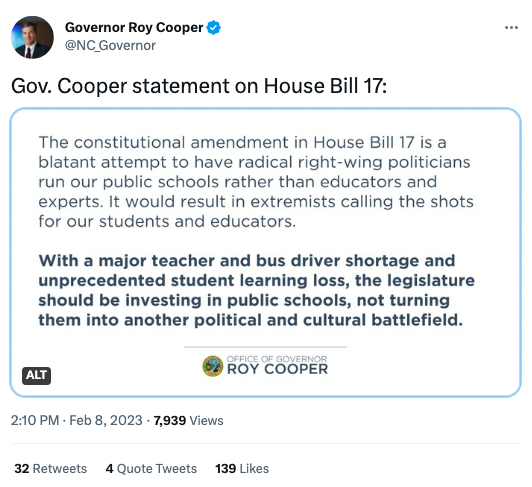- Rep. Tricia Cotham, D-Mecklenburg, broke ranks with her party to support an amendment that could shift the balance of power on the N.C. State Board of Education.
- Cotham is one of three Democrats to get powerful co-chair committee assignments in the new session.
North Carolina Rep. Tricia Cotham of Mecklenburg County was the only Democrat to support a proposed constitutional amendment that would make members of the N.C. Board of Education elected rather than appointed.
The vote was taken Feb. 7 during the House K-12 Education Committee. Cotham is the newly minted co-chair of the committee, along with Republican Reps. Hugh Blackwell of Burke County and John Torbett of Gaston County.
Under the amendment, House Bill 17, membership on the board would expand to the 14 seats that correspond to North Carolina’s number of congressional districts, and each member would be elected in their respective congressional district. The amendment would also make Republican Superintendent of Public Instruction Catherine Truitt the chair of the board.
With Cotham’s support, H.B. 17 ostensibly would have enough votes to achieve the required 72 votes on the full House floor to pass. If approved by a three-fifths majority of both chambers, the amendment would appear on the ballot in the 2024 General Election for a simple majority vote. Constitutional amendments are not subject to a veto by the governor.
The amendment is controversial because it could substantially shift the political balance of power on the state’s top educational governing body.
Under the current framework, members of the board are appointed by Democrat Gov. Roy Cooper for eight-year terms, subject to confirmation by the General Assembly. But of the currently serving members, only three are Republican appointees: Olivia Oxendine, Amy White, and Eric Davis, who chairs the board and is registered unaffiliated. Republicans have added strength from ex officio members in Lt. Gov. Mark Robinson and State Treasurer Dale Folwell, who are not appointed and serve until their terms in office expire.
The bottom line is that Republicans often find themselves on the losing end of votes on key policy matters. The amendment could change that power dynamic.
During debate in committee, Blackwell said it makes better sense to have the elected superintendent of public instruction helm the state board rather than an appointed member.
“Rather than freezing parents and members of the public out of the process, it’s appropriate to let them have a voice in who is making education policy for their children and grandchildren and their neighbors’ children,” Blackwell said.
Rep. Marcia Morey, D-Durham, questioned the fact that the amendment would remove appointment powers from the governor.
“I’m afraid we’re taking away from the governor, who is the state’s top leader elected because of the policies, and education is always a governor candidate’s top policy, typically,” Morey said. “I think the governor looks across the state to these districts to find the best educational leaders he can, with the confirmation of the General Assembly. I’m very worried about taking away that responsibility of the governor and putting it into another partisan political race.”
On Feb. 8, Cooper released a statement opposing the proposed amendment, claiming it would put “radical right-wing politicians” in charge of schools.

The next stop for H.B. 17 is the House Judiciary Committee.
This story was updated Feb. 8 with a statement from Gov. Roy Cooper.